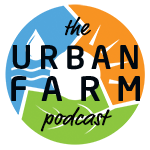371: Philip Ackerman-Leist on Pesticide-Free Communities.
Documenting the first town-wide pesticide-free ordinance in the world.
 Philip is Professor of Sustainable Agriculture & Food Systems at Green Mountain College in Vermont, where he established the college’s organic farm, sustainable agriculture curricula, and the first online graduate program in Sustainable Food Systems in the United States.
Philip is Professor of Sustainable Agriculture & Food Systems at Green Mountain College in Vermont, where he established the college’s organic farm, sustainable agriculture curricula, and the first online graduate program in Sustainable Food Systems in the United States.
He and his wife Erin live on a remote off-grid farm in Pawlet, Vermont with their three children, where they raise grass fed American Milking Devons cattle. He is the author of Rebuilding the Foodshed: How to Create Local, Sustainable, and Secure Food Systems and Up Tunket Road: The Education of a Modern Homesteader. His newest book is A Precautionary Tale: How One Small Town Banned Pesticides, Preserved its Food Heritage, and Inspired a Movement, Published by our friends at Chelsea Green Publishing.Don’t miss an episode! Click here to sign up for podcast updates
In This Podcast:
On a trip overseas, a professor of Sustainable Agriculture & Food Systems stumbled onto a story worth telling about the first community in the world to ban pesticides. Philip Ackerman-Leist was able to document this endeavor from almost the very beginning and he shares the reasons why anyone who cares about their community needs to understand what happened and why it is so important.
Listen in and learn about:
-
- His early interest in agriculture
- Finding the kind of farming that he loved in a community that had been around for 30-35 years
- Starting the sustainable ag program at the college
- Getting away from the pesticides and looking at sustainable farming
- Stumbling upon the story of Mals, the town that rejected pesticides
- The timeline of watching it happen
- The grassroots activism that helped change the regulations for their community
- Stopping pesticides from entering their community before the apple farmers got established
- Wanting to preserve their organic culture
- Why the women of the town were essential to making the change take place
- Turning bedsheets into banners with a stenciling campaign
- Keeping the message positive and getting the support of the community as a whole
- Becoming a model for other communities in the EU
- Precautionary principle
- The pharmacist and the pediatrician writing a manifesto
- The need to be informed about the precautionary principle
- The movement Toppling Goliath
- The graduate program on Sustainable Agriculture
As well as:
His failure – Teaching sustainable agriculture for a number of years without thinking past the farmgate and considering the food plate
His success – Starting a 23-acre college farm & sustainable agriculture program from a few garden beds worked initially only by himself
His drive – Growing up in his family with a yearning for social justice and fairness
His advice – Embrace the audacious vision while embracing the humility and wisdom of small incremental successes.
Books written by Phillip:Phillip’s Book recommendations:
What’s Making Our Children Sick?: How Industrial Food Is Causing an Epidemic of Chronic Illness, and What Parents (and Doctors) Can Do About It
by Michelle Perro, MD, and Dr Vincanne Adams PhD
Producer’s Note:
You can also find the above listed books at one of our favorite local independent bookstores for just a little bit more and know that you are supporting a small business.
How to reach Phillip:
Website: www.topplinggoliath.org
Email: ackermanleistp@gmail.com
UrbanFarm.org/topplinggoliath
*Disclosure:
Some of the links in our podcast show notes and blog posts are affiliate links and if you go through them to make a purchase, we will earn a nominal commission at no cost to you. We offer links to items recommended by our podcast guests and guest writers as a service to our audience and these items are not selected because of the commission we receive from your purchases. We know the decision is yours, and whether you decide to buy something is completely up to you.




